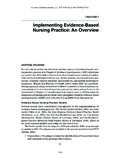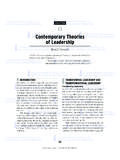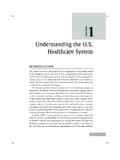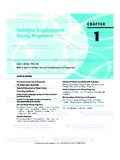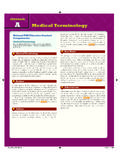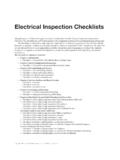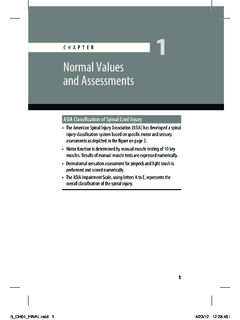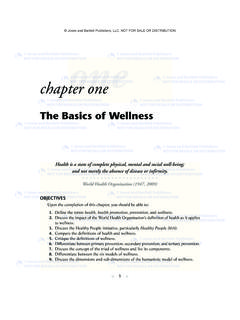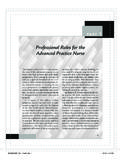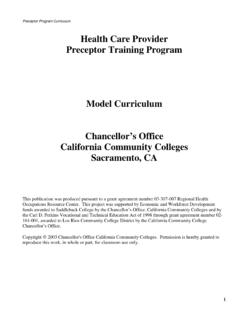Transcription of DNP Involvement in Healthcare Policy and Advocacy
1 DNP Involvement in Healthcare Policy and AdvocacyMarlene H. Mullin I am not discouraged because every wrong attempt discarded is another step forward. Thomas Edison (1847 1931)Our nation currently faces many challenges. In 2010, million Americans of all ages (16%) were uninsured at the time of the National Health Interview Survey (NHIS) conducted by the Cen-ters for Disease Control and Prevention s (CDC) National Center for Health Statistics (NCHS) (2011). According to the Department of Housing and Urban Development (HUD), an estimated 649,879 persons are homeless at any given night in the United States, with 109,920 being chronically homeless ( Department of Housing and Urban Development, 2010). Disparities in health care, education, food distribution, and housing demand the attention of the DNP the enormity of these problems may seem daunting and may cast doubts on how one can make a difference, DNP graduates possess the tools to make changes in our society.
2 Knowledge and education are pow-erful instruments; DNP graduates possess both. DNP graduates also pos-sess practice experience, leadership skills, and knowledge regarding research and evidence-based practice, which allows them to be powerful advocates for Healthcare policies. Utilizing the gifts of knowledge, education, practice expe-rience, leadership skills, and research to their full potential for the betterment of society is a challenge that all DNPs must undertake. Due to our nation s many challenges, it is imperative that DNP graduates become involved in matters shaping Healthcare Policy and promoting Advocacy . DNP graduates are prepared to meet these H A P T E R 0 0C H A P T E R 13112/29/11 9:04 AM Jones & Bartlett Learning, LLC. NOT FOR SALE OR DISTRIBUTION. Jones & Bartlett Learning, LLCNOT FOR SALE OR DISTRIBUTION Jones & Bartlett Learning, LLCNOT FOR SALE OR DISTRIBUTION Jones & Bartlett Learning, LLCNOT FOR SALE OR DISTRIBUTION Jones & Bartlett Learning, LLCNOT FOR SALE OR DISTRIBUTION Jones & Bartlett Learning, LLCNOT FOR SALE OR DISTRIBUTION Jones & Bartlett Learning, LLCNOT FOR SALE OR DISTRIBUTION Jones & Bartlett Learning, LLCNOT FOR SALE OR DISTRIBUTION Jones & Bartlett Learning, LLCNOT FOR SALE OR DISTRIBUTION Jones & Bartlett Learning, LLCNOT FOR SALE OR DISTRIBUTION Jones & Bartlett Learning, LLCNOT FOR SALE OR DISTRIBUTION Jones & Bartlett Learning, LLCNOT FOR SALE OR DISTRIBUTION Jones & Bartlett Learning, LLCNOT FOR SALE OR DISTRIBUTION Jones & Bartlett Learning, LLCNOT FOR SALE OR DISTRIBUTION Jones & Bartlett Learning, LLCNOT FOR SALE OR DISTRIBUTION Jones & Bartlett Learning, LLCNOT FOR SALE OR DISTRIBUTION Jones & Bartlett Learning.
3 LLCNOT FOR SALE OR DISTRIBUTION Jones & Bartlett Learning, LLCNOT FOR SALE OR DISTRIBUTION Jones & Bartlett Learning, LLCNOT FOR SALE OR DISTRIBUTION Jones & Bartlett Learning, LLCNOT FOR SALE OR DISTRIBUTION Jones & Bartlett Learning, LLCNOT FOR SALE OR DISTRIBUTIONN ursing s Social Policy Statement (ANA, 1995) clearly states the nursing profes-sion s commitment to society and the people who are served. nursing s relationship with society is based on an ethic of trust and the principle of justice (Ballou, 2000, p. 178). Involvement in Healthcare Policy and Advocacy that addresses issues of social justice and equity in health care are vital roles that all DNP graduates must assume to fulfill our responsibility to society (AACN, 2006).It is also important for DNP graduates to remember that political decisions and social Policy initiatives have an impact on the practice of nursing . DNP graduates need to attain a place at the table where Policy decisions are made to have a say in the policies that govern nursing .
4 DNP graduates are prepared to assume a leadership role in influencing and shaping policies that affect nursing chapter provides a brief overview of the history of nursing s Involvement in Healthcare Policy and Advocacy . Specific strategies for becoming informed and involved in Healthcare Policy and Advocacy are outlined. Two interviews with advanced practice registered nurses (APRNs) who have been active in Healthcare Policy and Advocacy for many years are provided. The first interview is with Jeanette Wrona Klemczak, Michigan s Chief Nurse Executive. The second interview is with Nancy M. George, who is assistant Director of the DNP Program and assistant Professor of nursing at Wayne State University College of nursing . Dr. George is also President-Elect of the Michigan Council of Nurse Practitioners (MICNP) and Chairperson of the Michigan APRN Coalition. Finally, the chapter provides a specific case scenario that illustrates a DNP graduate s Involvement in Healthcare Policy and Advocacy .
5 Curriculum StandardsEssential V of the Essentials of Doctoral Education for Advanced nursing Practice (AACN, 2006) provides specific curriculum standards for the DNP graduate related to Healthcare Policy and Advocacy under the title Healthcare Policy for Advocacy in Health Care. Essential V states that DNP programs prepare graduates for the fol-lowing activities related to Healthcare Policy and Advocacy :DNP graduates are prepared to design, influence, and implement Healthcare policies that frame health care financing, practice regulation, access, safety, quality and efficacy (IOM, 2001). Moreover, the DNP graduate is able to design, implement, and advocate for Healthcare Policy that addresses issues of social justice and equity in health care. The powerful practice experiences of the DNP graduate can become potent influencers in Policy formation. Additionally, the DNP graduate integrates these practice experi-ences with two additional skill sets: the ability to analyze the Policy process and the ability to engage in politically competent action.
6 (O Grady, 2004)The DNP graduate has the capacity to engage proactively in the development and implementation of health Policy at all levels, including institutional, local, state, regional, federal, and international levels. DNP graduates as leaders in the practice 132 Chapter 5 DNP Involvement in Healthcare Policy and Advocacy 13212/29/11 9:04 AM Jones & Bartlett Learning, LLC. NOT FOR SALE OR DISTRIBUTION. Jones & Bartlett Learning, LLCNOT FOR SALE OR DISTRIBUTION Jones & Bartlett Learning, LLCNOT FOR SALE OR DISTRIBUTION Jones & Bartlett Learning, LLCNOT FOR SALE OR DISTRIBUTION Jones & Bartlett Learning, LLCNOT FOR SALE OR DISTRIBUTION Jones & Bartlett Learning, LLCNOT FOR SALE OR DISTRIBUTION Jones & Bartlett Learning, LLCNOT FOR SALE OR DISTRIBUTION Jones & Bartlett Learning, LLCNOT FOR SALE OR DISTRIBUTION Jones & Bartlett Learning, LLCNOT FOR SALE OR DISTRIBUTION Jones & Bartlett Learning, LLCNOT FOR SALE OR DISTRIBUTION Jones & Bartlett Learning, LLCNOT FOR SALE OR DISTRIBUTION Jones & Bartlett Learning, LLCNOT FOR SALE OR DISTRIBUTION Jones & Bartlett Learning, LLCNOT FOR SALE OR DISTRIBUTION Jones & Bartlett Learning, LLCNOT FOR SALE OR DISTRIBUTION Jones & Bartlett Learning, LLCNOT FOR SALE OR DISTRIBUTION Jones & Bartlett Learning, LLCNOT FOR SALE OR DISTRIBUTION Jones & Bartlett Learning.
7 LLCNOT FOR SALE OR DISTRIBUTION Jones & Bartlett Learning, LLCNOT FOR SALE OR DISTRIBUTION Jones & Bartlett Learning, LLCNOT FOR SALE OR DISTRIBUTION Jones & Bartlett Learning, LLCNOT FOR SALE OR DISTRIBUTION Jones & Bartlett Learning, LLCNOT FOR SALE OR DISTRIBUTION arena provide a critical interface between practice, research, and Policy . Preparing graduates with the essential competencies to assume a leadership role in the devel-opment of health Policy requires that students have opportunities to contrast the major contextual factors and Policy triggers that influence health Policy making at the various DNP program prepares the graduate to:1. Critically analyze health Policy proposals, health policies, and related issues from the perspective of consumers, nursing , other health professions, and other stakeholders in Policy and public Demonstrate leadership in the development and implementation of institu-tional, local, state, federal, and/or international health Influence Policy makers through active participation on committees, boards, or task forces at the institutional, local, state, regional, national, and/or inter-national levels to improve Healthcare delivery and Educate others, including Policy makers at all levels regarding nursing , health Policy , and patient care Advocate for the nursing profession within the Policy and Healthcare Develop, evaluate, and provide leadership for Healthcare Policy that shapes Healthcare financing, regulation, and Advocate for social justice, equity, and ethical policies within all Healthcare arenas.
8 (AACN, 2006, p. 13 14) Historical PerspectiveThe modern nursing movement was started by Florence Nightingale in 1860 when she opened the first nurse training program at St. Thomas Hospital in England (Lewenson, 2007). This landmark event signaled to the world that nurses required schooling for the work they did (Lewenson, 2007, p. 23). Nightingale s concept that nurses should be trained, supervised, and managed by nurses themselves was a model adopted by many nurse training programs during this period. She believed that nursing and medi-cine should be separate disciplines. Most important, Nightingale believed nursing should organize and control itself. Nightingale s ambitious letter writing to influential people enabled her to obtain support for changes in health care and nursing educa-tion. She ultimately was able to garner support worldwide for her visionary ideas about sanitation, nursing education, and the separation of nursing from the United States, the modern nursing movement began with the opening of many Nightingale-influenced nurse training schools in 1873 (Lewenson, 2007).
9 This also signaled the changing role of women in society. The nursing profession provided one of the first opportunities for women to work outside the home and financially support themselves. However, due to the fact that nursing s roots were in the church and military, patriarchal control existed (Lewenson, 2007). To overcome this issue, Historical Perspective 133 13312/29/11 9:04 AM Jones & Bartlett Learning, LLC. NOT FOR SALE OR DISTRIBUTION. Jones & Bartlett Learning, LLCNOT FOR SALE OR DISTRIBUTION Jones & Bartlett Learning, LLCNOT FOR SALE OR DISTRIBUTION Jones & Bartlett Learning, LLCNOT FOR SALE OR DISTRIBUTION Jones & Bartlett Learning, LLCNOT FOR SALE OR DISTRIBUTION Jones & Bartlett Learning, LLCNOT FOR SALE OR DISTRIBUTION Jones & Bartlett Learning, LLCNOT FOR SALE OR DISTRIBUTION Jones & Bartlett Learning, LLCNOT FOR SALE OR DISTRIBUTION Jones & Bartlett Learning, LLCNOT FOR SALE OR DISTRIBUTION Jones & Bartlett Learning, LLCNOT FOR SALE OR DISTRIBUTION Jones & Bartlett Learning, LLCNOT FOR SALE OR DISTRIBUTION Jones & Bartlett Learning, LLCNOT FOR SALE OR DISTRIBUTION Jones & Bartlett Learning, LLCNOT FOR SALE OR DISTRIBUTION Jones & Bartlett Learning, LLCNOT FOR SALE OR DISTRIBUTION Jones & Bartlett Learning, LLCNOT FOR SALE OR DISTRIBUTION Jones & Bartlett Learning, LLCNOT FOR SALE OR DISTRIBUTION Jones & Bartlett Learning.
10 LLCNOT FOR SALE OR DISTRIBUTION Jones & Bartlett Learning, LLCNOT FOR SALE OR DISTRIBUTION Jones & Bartlett Learning, LLCNOT FOR SALE OR DISTRIBUTION Jones & Bartlett Learning, LLCNOT FOR SALE OR DISTRIBUTION Jones & Bartlett Learning, LLCNOT FOR SALE OR DISTRIBUTION political action was necessary by nurses, as well as women in general, to obtain control over their education, work, and 1873 and 1893, many more nurse training schools were opened, with the number rising to more than 1,129 by 1910 (Burgess, 1928). During this time, nursing was not regulated by any professional nursing group, which resulted in significant misuse of nurses. In fact, physicians and pharmacists controlled much of nursing practice, particularly in the private duty sector (Lewenson, 2007). Ultimately, this mistreatment and lack of control and regulation was the impetus for early nursing leaders to form professional nursing organizations (Lewenson, 2007).The first professional nursing organizations were formed between 1893 and 1912.
